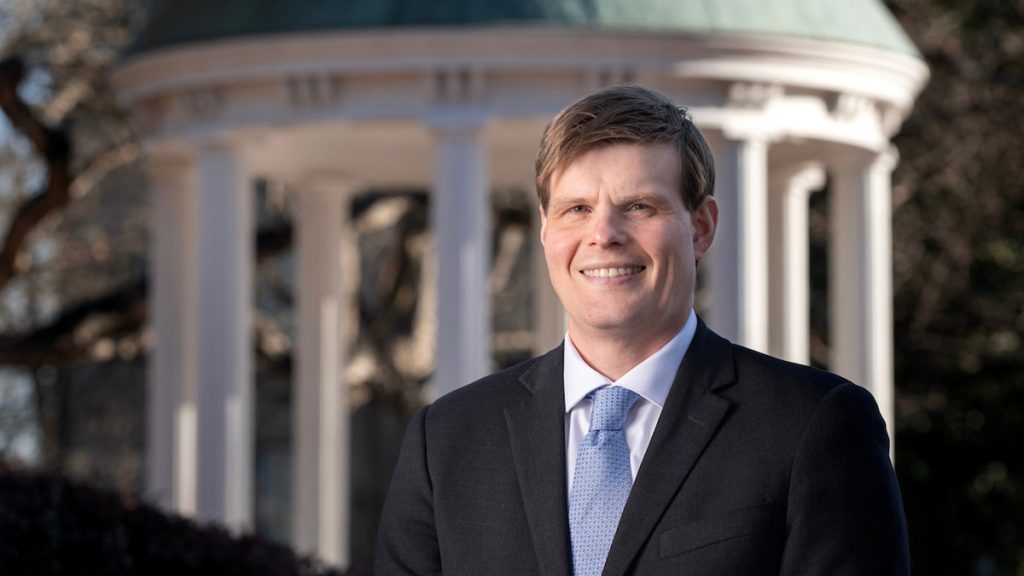The new leader of the School of Civic Life and Leadership talks about how to build a “free speech culture.”

Jed Atkins, a graduate of England’s elite Cambridge University and a 15-year faculty member at Duke University, is also a small-town native who took his first college classes at Penn State University, where his father was an environmental systems technician.
It’s that combination of different experiences in his own life that influenced his work as director of Duke’s Civil Discourse Project and that he will build on as the inaugural director and dean of Carolina’s School of Civic Life and Leadership.
Since SCiLL is housed within the College of Arts and Sciences and its classes part of the general education curriculum, its reach is potentially broader than that of any other school. The school recently announced the launch of its new minor in civic life and leadership, an interdisciplinary offering designed to complement any major.
“By having a very wide-based audience, you bring people together to investigate deeply human questions about liberty, justice and equality,” Atkins said. “And wrestling with these questions helps us transcend the very different places from which we start.”
While Atkins is new to Carolina, the role he begins March 28 represents a homecoming of sorts. His wife, Claire Black Atkins, is the daughter of former political science professor Merle Black and spent her early childhood in Chapel Hill. In recent years, Atkins’ team at Duke has also co-sponsored events with Carolina’s Program for Public Discourse, the College-based program that laid the groundwork for SCiLL and is now part of the school.
“Thanks to the hard work of the PPD team, a significant portion of the local community has come to see the value of the program for fostering a much-needed capacity for public deliberation,” Atkins said.
Building a free speech culture
At Duke, Atkins has led both classroom and outreach activities related to civil discourse. As the E. Blake Byrne Associate Professor of Classical Studies and an associate professor of philosophy and political science, Atkins has encouraged discussion by building a “free speech culture.”
The Civil Discourse Project, which sponsors courses, events and scholarship, is part of building that culture. Atkins also directs the Transformative Ideas Project, in which sophomores connect conversations in the classroom and the residence hall.
“We have a civil discourse dorm,” he said. “In the common room of this residence hall, student leaders model charity, active listening and intellectual humility to younger students as they lead discussions about weighty topics like the existence of God or the role of merit in a good society.”
He compares the effort involved to how pianists learn by practicing their scales or basketball players improve by running drills. The skills or virtues that students and faculty are developing, he said, are charity, humility and friendship.
“That culture is created by a commitment of all members of the community to listen well, to show intellectual humility, to give one another the benefit of the doubt,” he said. “Free speech is a gift we give to each other.”
Footnote in the future
As a scholar of ancient Greco-Roman philosophy, Atkins takes the long view historically. He’s hopeful that today’s political polarization — often fueled by social media algorithms that reward extremism and penalize moderation — may become just “a footnote that historians talk about.”
He looks forward to training generations of “thoughtful citizens who think reflectively about our political life” at SCiLL and in partnership with other Carolina schools. “Imagine what the state would look like after 40 years,” he said. “It could change North Carolina.”
That’s the vision that inspires Atkins. “The opportunity to be part of that dream, to have an opportunity to help build that dream, and to bring others into partnership with that dream was a huge factor in me accepting this position.”
By Susan Hudson, University Communications
